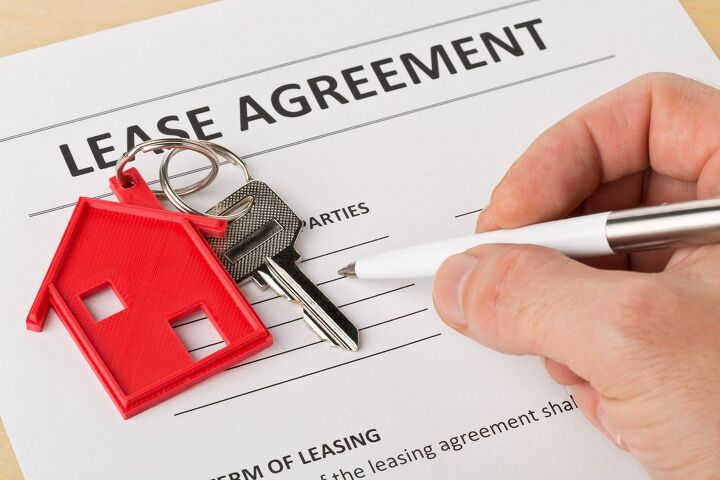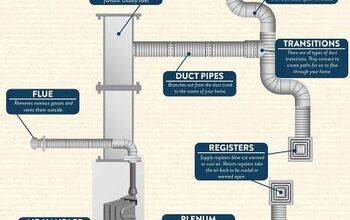Is It Better To Break A Lease Or Get Evicted?

There is nothing worse than being stuck with a bad lease or landlord. Whether you’re struggling to pay rent or want to move somewhere else, sometimes the only option is to break the lease or get evicted. So, is it better to break a lease or get evicted?
It is better to break your lease than to get evicted because getting evicted can make it harder to get an apartment in the future. Reach an agreement with your landlord so that you can break your lease without it affecting your credit score. Evictions are a matter of public record and future prospective landlords will be able to know that you were evicted.
Neither option is ideal, but it may be necessary to break a lease so that you don’t get evicted. Follow along as we explore why it’s better to break a lease than get evicted and see the best way to go about it.
Breaking a Lease Vs. Eviction
When your back is against the wall, you may have to choose between breaking a lease or getting evicted. Neither option sounds appealing, but sometimes those are your only two choices as difficult as it may be. Let’s take a look at the difference between getting evicted and breaking your lease and see how it affects your record.
Eviction
Eviction is when a tenant is legally removed from a home or apartment due to lease violations. You can get evicted by a landlord for several lease violations, such as:
- Damaging property
- Noise violations
- Pets that are not allowed
- Overdue rent
- Criminal activity
When you are evicted, it becomes a part of your permanent record and will make it harder to get a lease in the future. Much like a foreclosure, an eviction is a black mark on your record that lasts forever and will appear on future background checks. A landlord must provide the tenant with an eviction notice that begins the legal eviction process.
Some tenants purposely withhold rent to get evicted if the landlord won’t allow them to break a lease. However, that is not a good alternative because you will struggle to get approved for an agreement later on. It isn’t the end of the world if you are evicted, but it is not a good idea to purposely get evicted because of the negative consequences.
Breaking a Lease
There are many misconceptions about breaking a lease, but it isn’t always a bad thing. It is bad to break a lease if you don’t talk to your landlord about it beforehand. However, you can often break a lease if you speak to your landlord and propose an agreement.
Explain your situation to your landlord and see if they can agree to let you out of the lease without penalty. However, it is possible to break a lease on accident or even purposely if you neglect the rules. You can damage your credit score if you break a lease without your landlord’s consent.
However, it won’t wind up on your permanent record if you break a lease like with an eviction. You can even ask your landlord to serve as a reference if you break a lease and leave your apartment on good terms. Pay attention to your rental agreement to make sure that you don’t do anything that could break your lease.
Eviction Rates Per State
Eviction rates per state are determined by the number of people evicted per capita. Below is a list of the top 10 states with the highest eviction rates.
The reason for these high numbers of evictions in the effected states have to due with their respective economic climates. Currently, the most recent state eviction rate figures available date back to 2016.
| State | Eviction Rate | Evictions in 2016 |
| 1. South Carolina | 8.9% | 41,099 |
| 2. Virginia | 5.1% | 51,821 |
| 3. Delaware | 5.1% | 5,468 |
| 4. Georgia | 4.7% | 59,963 |
| 5. North Carolina | 4.6% | 62,539 |
| 6. Oklahoma | 4.2% | 21,814 |
| 7. Indiana | 4.1% | 31,767 |
| 8. Mississippi | 4.0% | 12,479 |
| 9. Arizona | 3.9% | 8,339 |
| 10. Maryland | 3.6% | 4,694 |
Each of the above states vary in size and population. What these states have in common, however, is that they have eviction rates much higher than the rest of the U.S. Unfortunately, many of the above states have had high eviction rates for many years.
How Does An Eviction Affect Your Record?
Evictions affect your record by being visible for 7 years. That means that all future landlords have access to the record of your prior eviction. Typically, landlords will be reluctant to begin a lease with a future tenant that has been evicted in the past. That does not mean that it will keep you from getting a lease in the future, it just may make it harder.
Unfortunately, evictions can also lower your credit score much like breaking a lease can. Luckily, evictions can be expunged from your record before that seven year period is up.
How Can I Get My Eviction Expunged From My Record?
The only way to get your eviction expunged is by legally challenging it. Evictions and eviction expungements are a matter of civil law. As such, you need to be very diligent and careful with all documentation regarding the eviction.
You need to petition the court if you want your eviction removed from public record. Here are some actions that you need to take to have your eviction expunged:
1. Gather Any Evidence
What were the grounds of the eviction? If it was a matter of lease violations and you have evidence to support that you didn’t in fact violate the agreement, present it.
If you did violate the agreement but it was for good reason, put those reasons down on paper. For example, if it was a dangerous environment that caused you to withhold rent, provide evidence.
2. Provide Proof of Rental Payments
If you actually made the rental payments that the landlord claims you didn’t, provide proof. Gather bank statements or checking account transaction history if possible.
3. Appeal to the Judge
A judge’s ruling can be largely based on how your case appeals to them and whether or not it is a just cause. If your actions show that there was an honest mistake or misunderstanding, it will fare well for you.
If you can prove that the eviction was wrongful, the judge will usually view the eviction as unjust. That can lead to the eviction being expunged from your record.
Related Questions
Does eviction affect your credit score?
Eviction doesn’t directly affect your credit, but it does appear on your permanent record. Your eviction will show up on your record for 7 years, but it may appear after that depending on your future landlord’s screening process. However, an eviction can affect your credit if you have to pay collections if you owed money to the landlord who evicted you.
Can you negotiate breaking a lease?
You can negotiate to break a lease if your landlord is willing to accept your terms. It is easier to negotiate to break a lease if you include a clause that allows you to before you sign the lease. Otherwise, you may have to convince your landlord to let you break the lease without it harming your permanent record.
Summing It Up
It is better to break a lease than for a landlord to evict you. Evictions stay on your record for 7 years and can prevent you from getting approval for a future lease or mortgage agreement. Breaking a lease can affect your credit score, but it doesn’t have to if you convince your landlord to let you out of it early.
Neither getting evicted nor breaking a lease are good, however, and both can affect how easily you can get a lease in the future. Include a clause in a lease before you sign it that gives you the freedom to break your lease without penalty to be extra safe. Otherwise, you can speak to your landlord and reach a mutually beneficial agreement.
Related Guides

Nick Durante is a professional writer with a primary focus on home improvement. When he is not writing about home improvement or taking on projects around the house, he likes to read and create art. He is always looking towards the newest trends in home improvement.
More by Nick Durante











![10 Best Scroll Saws for 2022 [Ultimate Reviews & Buyer's Guide]](https://cdn-fastly.upgradedhome.com/media/2023/07/31/9070684/10-best-scroll-saws-for-2022-ultimate-reviews-buyer-s-guide.jpg?size=350x220)


![Finishing Basement Without Permit [Is It Really Illegal?]](https://cdn-fastly.upgradedhome.com/media/2023/07/31/9070078/finishing-basement-without-permit-is-it-really-illegal.jpg?size=350x220)












